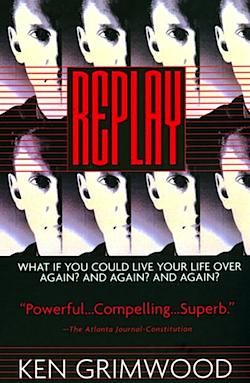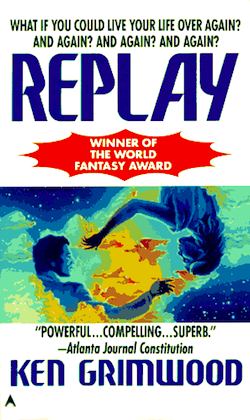Ken Grimwood’s Replay (1986) is the story of a man who dies in 1988 and finds himself back in his youthful body and dorm room of 1963—over and over and over again. He knows the future, he can change the world, but no matter what he changes he’s going to live through twenty-five years and die on that day and start again. And just when you think you know where the book is going, it starts to get really interesting.
The book isn’t just the one gimmick. Grimwood explores the idea in a proper science fictional way, ringing a lot of variations on it. It’s also brilliantly written—tense, taut, fascinating. It’s a quiet almost pastoral character study as much as anything, but when I’m reading it, I can’t put it down. Nevertheless, I don’t think I’ve ever had a conversation about it that wasn’t on the lines of: “If that happened to me, I’d…” The idea of re-living your own life while relieved from the burden of money worries and uncertainty is very appealing, and this is part of what makes the book so seductive.
Spoilers ahead. I mean it!
It won the World Fantasy Award and was shortlisted for the Clarke Award, while not coming near any of the others—if anyone wants an example of the usefulness of juried awards for finding brilliant things nobody else is paying attention to, this is a good one. But while the replaying isn’t ever scientifically explained, and therefore could be considered fantasy at a stretch, this is not like a fantasy novel. It’s absolutely SF in look and feel.
I very much like the different lives Jeff leads—the great riches life, the laid back life with Judy, the one with drugs, the one with the film Starsea, the one where he changes all of history. This is very much a story of his relationships with women—his original wife, Linda, his college girlfriend, and then Pamela, who is literally the only woman in the world for him because she’s the only other replayer. (Apart from the lunatic murderer they find.) Once he finds Pamela it’s a different book, the lives start to get shorter and the possibility of losing life is again on the table. That’s a very good piece of pacing. It really works.
At the end, when Jeff doesn’t die but instead carries on with his original life, I don’t think he’d be any better equipped for it than he would have been without all those extra lifetimes of doing different things. Every single time he has used his knowledge of the future to make himself rich and increase his options. Back in the present and moving into an uncertain future, the skills of money management and cheating by knowing what will happen won’t help—he won’t know, and he has no money to invest anyway. I don’t think spending half a dozen lifetimes rich will help at all with the problems of his original life, so many of which are caused by lack of money. And that does make it all pointless. I also can’t understand why Jeff never takes the opportunity to stay in college and switch majors and study other things. I understand that he doesn’t want to take the same courses over again, but he’s at an American university, he doesn’t appreciate the opportunities he has. (I could happily spend four years of far more lifetimes than he has taking random courses.) And then he’d have some more skills, or at least more information. I feel he wasted his opportunities. It’s a bit different for Pamela, who has done learned to paint and make movies. I think she’ll be better equipped to face the future.
 Also, I think Grimwood underestimates how many books there are in the world, even written in English, never mind translations. And I think he neglects the possibilities of the rest of the world. Living in a different country for twenty-five years would have been worth trying if he wanted something different—actually, other countries are real, and interesting places, not just for exotic vacations for rich Americans.
Also, I think Grimwood underestimates how many books there are in the world, even written in English, never mind translations. And I think he neglects the possibilities of the rest of the world. Living in a different country for twenty-five years would have been worth trying if he wanted something different—actually, other countries are real, and interesting places, not just for exotic vacations for rich Americans.
Grimwood can’t have intended it, because of when the book was written, but this time I kept thinking how the world was about to change completely in 1989/90 from the Cold War world Jeff and Pamela knew, and whether whoever arranged the replaying did know that.
If it happened to me, I wouldn’t be able to win a penny on a single sporting event or horserace. It isn’t implausible that Jeff can—I’m sure lots of people can remember who won a Series or a Derby twenty-five years ago. But I have never paid any attention to any of this, and the comparable things I do know—what won the Hugo—aren’t the kinds of things people bet on.
This was written well before Groundhog Day (1993), and while there are definitely some similarities, there are also major differences—twenty-five years is a lot different from one day, in terms of how used you’d get to being able to have do-overs. One thing they both have in common is how they remind me of starting a computer game from a saved position—something that can’t really have influenced either of them. I wonder whether it influenced Kaleidoscope Century?
A version of this article originally appeared on Tor.com in March of 2010.
Jo Walton is a science fiction and fantasy writer. She’s published two poetry collections and nine novels, most recently Among Others, and if you liked this post you will like it. She reads a lot, and blogs about it here regularly. She comes from Wales but lives in Montreal where the food and books are more varied.











I find it amusing you posting this on Groundhog’s Day. Not to mention the fact that you reviewed this book less than a year ago, so I initially had a sense of Deja Vu to the whole post.
I did end up reading this book on your recommendation from last year and really loved it. I thought the choices he makes in each jump are very reactionary based on the previous one, and they made sense to me. You complain about not taking better advantage of the situation, but I don’t remember there being that many jumps, were there? I mean, Bill Murray learns to play piano, but that’s after likely more than a year of living the same day over and over.
Interestingly enough, I HATED Kaleidoscope Century. I don’t care what sort of cool idea a book has if all it’s characters are as morally reprehensible as the ones in that book.
Well, I still remember who won the Kentucky Derby in 1971. Canonero II, in one of the biggest upsets ever. Send me back to 1971; I’ll clean up …
My memory of this book is the newspaper ad- ‘Do you remember Flashdance?’ I don’t think that I’d seen that in previous alternate universe stories, and it struck me as a good technique for finding ‘the others.’
Clearly time for a re-read. If I bounce back, would someone please remind me not to flunk out of college?
I found this book really traumatizing, actually, but from the comfortable distance of 20+ years I can’t clearly remember why. I still shudder a little when I run across it in an old box of books, though.
I think it was the utter futility of it all – like you said, he never seemed to actually learn anything, which made the resets ultimately pointless because nothing could ever truly be accomplished. And since it was such a huge stretch of time per life, you couldn’t even get bad things over with quickly. I especially hated the life where they ended up captives telling the future for their CIA(?) handler, who never actually believed that they came from the future, and therefore didn’t believe them when they could no longer predict it. So that life was both futile and scary.
That’s not to say it wasn’t a good book – obviously, it has stuck with me. It just managed to hit all my wrong buttons.
Jo,
Great book. Great write-up.
There’s a fourth replayer who turns up right at the end, but they never find out about him.
There was one life in which Jeff and Pamela revealed themselves to the world. I’m surprised no one asked why they hadn’t tried tosave Martin Luther King or Bobby Kennedy. How about an anthology dealing with various prominent personages being able to live their lives again-Churchill,Hitler,Lincoln,et al?
Malgré le fait que le nombre des Français décidant de mieux supporter la hausse des frais de santé augmente, les professionnels de mutuelles santé s’efforcent tout de même d’aligner leurs tarifs et formules à tous les niveaux de budget de chaque patient. Cependant, il est important de ne pas oublier que le tarif n’est pas le seul point indispensable sur lequel doit se poser le choix. En effet, même si le prix semble intéressant, il faut bien vérifier d’autres critères.Non seulement il est tout à fait logique que le tarif attractif intéresserait n’importe qui, mais le phénomène de la crise intensifie également cette attraction. Ainsi, au moment où le futur adhérent tente de trouver une mutuelle, il lui est particulièrement conseillé de ne pas seulement se contenter du tarif pas cher, soit à la portée de son budget, mais en même temps voir de près et étudier les garanties qui accompagnent ce prix, puisque visiblement l’une des grandes attentes des souscripteurs en adhérent à une mutuelle est de pouvoir bénéficier d’une bonne couverture, donc c’est un point qu’il ne faut pas du tout négliger.
Besides the fourth replayer at the end, I think there was a fifth replayer – the person who sent him the letter from Australia in response to his “do you remember” ad. The response simply read “Not yet. Wait.” I think that was from someone caught in a past replay cycle who recognized the intent of the ad, although they did not recognize the specific events in the ad.
I went to prep school with Ken at Indian Springs and he and I went to Summer School at The Sorbonne in 1961. I am not terribly familiar with his writings but can verify that he was an “ok” guy from Pensacola, fl. Ken loved the nightlife in Paris I well remember and I could not keep up with the late night hours. We had no idea he would become a writer. Our school’s John Green has come up with a hit movie from his book. I am sad to say that our school probably did not recognize his genius before his premature death. RIP Ken.